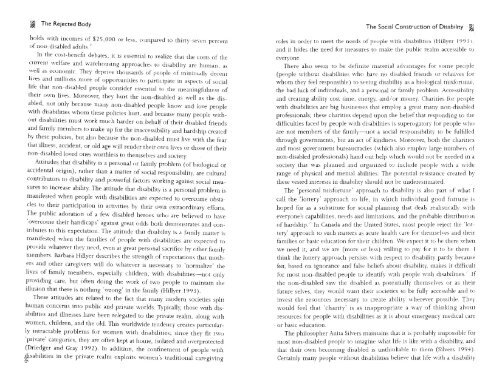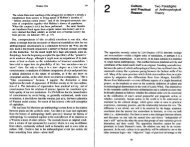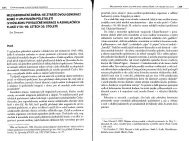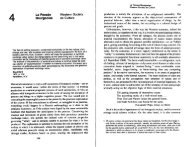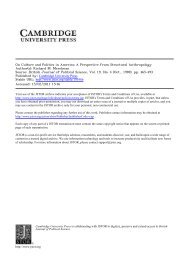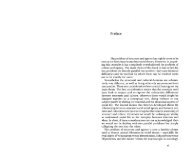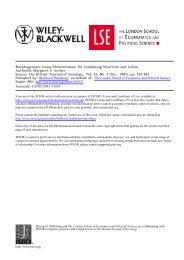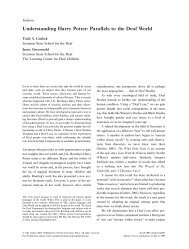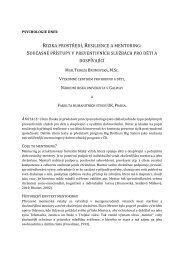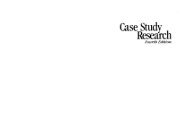The Social Construction of Disability - Moodle
The Social Construction of Disability - Moodle
The Social Construction of Disability - Moodle
Create successful ePaper yourself
Turn your PDF publications into a flip-book with our unique Google optimized e-Paper software.
~ <strong>The</strong> Rejected Bodyholds with incomes <strong>of</strong> $ 25, 000 or less, compared to thirty-seven percentC<strong>of</strong> nOlI-disabled adults 2In the cost-benefit debates, it IS essential to realize that the costs <strong>of</strong> thecurrent welfare and warehousing approaches to disability are human, aswell as economic. <strong>The</strong>y deprive thousands <strong>of</strong> people <strong>of</strong> minimally decentli ves and millions more <strong>of</strong> opportunities to participate in aspects <strong>of</strong> sociallife that non-disabled people consider essential to the meaningfulness <strong>of</strong>their own lives. Moreover, they hurt the non-disabled as well as the disabled,not only because many lion-disabled people know and love peoplewith disabilities whom these policies hurt, and because many people Withoutdisabilities must work much harder on behalf <strong>of</strong> their disabled friendsand family members to make up for the inaccessibility and hardship createdby these policies, but also because the non-disabled must live with the fearthat illness, accident, or old age will render their own lives or those <strong>of</strong> theirnon-disabled loved ones worthless to themselves and societyAttitudes that disability is a personal or family problem (<strong>of</strong> biological oraccidental origin), rather than a matter <strong>of</strong> social responsibility, are culturalcontributors to disability and powerful factors working against social measuresto increase ability <strong>The</strong> attitude that disability is a personal problem ismanifested when people with disabilities are expected to overcome obstaclesto their participation in activities by their own extraordinary efforts.<strong>The</strong> public adoration <strong>of</strong> a few disabled heroes who are believed to have'overcome their handicaps' against great odds both demonstrates and contributesto this expectation <strong>The</strong> attitude that disability is a L1mily matter ismanifestcr] when the families <strong>of</strong> people with disabilities are expected toprovide whatever they need, even at great personal sacrifice by other familymembers. Barbara Hillyer describes the strength <strong>of</strong> expectations that mothersand other caregivers will do whatever is necessary to 'normalize' thelives <strong>of</strong> family members, especially children, with disabilities-not onlyproviding care, but <strong>of</strong>ten doing the work <strong>of</strong> two people to maintain theillusion that there is nothing 'wrong' in the family (Hillyer 1993).<strong>The</strong>se attitudes are related to the fact that many modern societies splithuman concerns into public and private worlds. Typically, those with disabilitiesand illnesses have been relegated to the private realm, along withwomen, children, and the old. This worldwide tendency creates particularlyintractable problems for women with disabilities; since they fit two'private' categories, they are <strong>of</strong>ten kept at home, isolated and overprotected(Driedger and Gray 1992). In addition, the confinement <strong>of</strong> people with8Jsabilities in the private realm exploits women's traditional caregivingo-<strong>The</strong> <strong>Social</strong> <strong>Construction</strong> <strong>of</strong> <strong>Disability</strong> ~roles in order to meet the needs <strong>of</strong> people with disabilities (Hillyer 1993).and it hides the need for measures to make the public realm accessible toeveryone.<strong>The</strong>re also seem to be definite material advantages for some people(people without disabilities who have no disabled friends or relauves forwhom they feel responsible) to seeing disability as a biological misfortune,the bad luck <strong>of</strong> individuals, and a personal or family problem. Accessi bilityand creating ability cost time, energy, and/or money. Charities for peoplewith disabilities are big businesses that employ a great many non-disabledpr<strong>of</strong>essionals; these charities depend upon the belief that responding to thedifficulties faced by people with disabilities is superogatory for people whoare not members <strong>of</strong> the family-not a social responsibility to be fulfilledthrough governments, bur an act <strong>of</strong> kindness. Moreover, both the charitiesand most government bureaucracies (which also employ large numbers <strong>of</strong>non-disabled pr<strong>of</strong>essionals) hand out help which would not be needed in asociety that was planned arid orgal1lzed [{J include people with a widerange <strong>of</strong> physical and mental abilities. <strong>The</strong> potential resistance created bythese vested interests in disability should not be underestimated<strong>The</strong> 'personal misfortune' approach to disability is also part <strong>of</strong> what Icall the 'lottery' approach to life, in which individual good fortune ishoped for as a substitute for social planning that deals realistically witheveryone's capabilities, needs and limitations, and the probable distribution<strong>of</strong> hardship." In Canada and the United States, most people reject the 'lottery'approach to such matters as acute health care for themselves and theirfamilies or basic education for their children We expect it to be there whenwe need it, and we are (more or less) willing to pay for it to be there. 1think the lottery approach persists with respect to disability partly becausefear, based on ignorance and false beliefs about disability, makes it difficultfor most non-disabled people to identify with people with disabilities." Ifthe non-disabled saw the disabled as potentially themselves or as theirfuture selves, they would want their societies to be fully accessible and toinvest the resources necessary to create ability wherever possible. <strong>The</strong>ywould feel that 'charity' is as inappropriate a way <strong>of</strong> thinking aboutresources for people with disabilities as it is about emergency medical careor basic education.<strong>The</strong> philosopher Anita SIlvers maintains that it is probahly impossible formost non-disabled people to imagine what life is like with a disability, andthat their own becoming disabled is unthinkable to them (Silvers 1994).Certainly many people without disabilities believe that life with a disability


